Unit 2 The Right Clothes-
2024年人教版英语四年级上册Unit 2 第六课时-课件

1. more 2.everything 3.put away 4.sweet dream 5. take out
a. 每件东西 b. 美梦 c. 拿出 d. 更多
e. 放好
Listen and find out the answer. (听听力,回答问题。)
What’s in Zoom’s schoolbag? Is Zoom’s schoolbag heavy?
Story time
Number the pictures. 根据课文,给图片标号。
3
1
2
5
6
4
跟读录音,注意语音语调 分角色表演对话内容。 老师评出最佳表演小组。
家庭作业 1 复习unit2的内容。 2 将今天的故事表演给爸爸妈妈看。
都二
能分
运浇
用灌
”二
,分
我管
Let's sing
Let's review
What are these?
Let's check
Story time
Put away your books!
Put away your toys!
Open your schoolbag, and take out your books.
们教
一,
起八
,分
静放
待手
花;
开二
。分
成
➢ Pure of heart, life is full of sweet and joy!
绩 ,
八
分
方
法
。
愿
全
天
下
所
有
父
母
我们,还在路上……
Unit 2-The things around us 单元同步资料及课文参考翻译(上教版必修三)
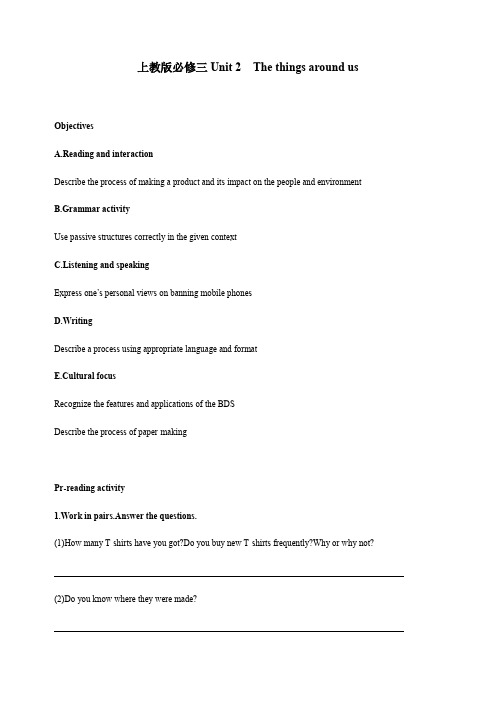
上教版必修三Unit 2 The things around usObjectivesA.Reading and interactionDescribe the process of making a product and its impact on the people and environment B.Grammar activityUse passive structures correctly in the given contextC.Listening and speakingExpress one’s personal views on banning mobile phonesD.WritingDescribe a process using appropriate language and formatE.Cultural focusRecognize the features and applications of the BDSDescribe the process of paper-makingPr-reading activity1.Work in pairs.Answer the questions.(1)How many T-shirts have you got?Do you buy new T-shirts frequently?Why or why not?(2)Do you know where they were made?2.Look at the title and the picture.Guess the answers to the questions below.Then read the passage to check your answers.(1)What type of passage may it be?A.A magazine article.B.A report.C.A leaflet.(2)Who is it written for?A.Children.B.Teenagers.C.Shop owners.(3)What may its main purpose be?A.To explain why people buy second-hand clothes.B.To give information about environmental problems.C.To encourage readers to change their habits.The story of a T-shirtLagos,Nigeria—Yaba market is busy,hot and dusty.People are looking around the second-hand shops,picking through piles of old clothes,and they’re all searching for deals.The market is flooded with cheap clothes from America and Europe,ad they usually sell out fairly quickly. “These clothes make people’s dreams come true,” says Abeke,a shop owner. “Everyone wears them.When they put them on,you can’t tell the difference between the rich and the poor.” At the front of Abeke’s store is a cotton T-shirt with the words “Get Real”.It’s picked up by a young guy who looks at it carefully.He tries it on and smiles—it fits him and it looks good.It’s a simple T-shirt,but it has a long story.A few years ago,the T-shirt started life in a cotton field in Uzbekistan.The cotton was watered every day and harmful chemicals were used to kill insects in the field.As the cotton grew,a young woman called Feruza picked it.She sweated in the field for ten to twelve hours every day in temperatures of over 30℃,but she was paid very little.Sometimes the chemicals hurt her eyes.Next,the cotton was flown to India.The T-shirt was made in a tiny factory in the Indian port city of Mumbai.There were 20 adults in it,five children and no air conditioning.The adults made the T-shirts and thechildren checked them.The finished T-shirt was sent to a huge discount shop in the UK.The people who shopped there didn’t know where the clothes came from.They didn’t want to spend a lot of money, but they wanted to look good.The T-shirt was cheap and it was bought by 15-year-old Ryan who liked the words on it.It was washed,worn and ironed and,after a few months,Ryan threw it away.His mum took it to a charity shop with some other old clothes,which were sold to an export company.A few weeks later,the T-shirt made its way to Yaba market in Nigeria.Back at the market,the young man takes off the T-shirt and looks at the $3 price tag.He hesitates for a moment and then he offers Abeke $1.50 because that’s all the cash he’s got.Abeke shakes her hand.As she hangs up the T-shirt at the front of the shop,the charity shop’s price tag is still on the back:25p.The journey of a T-shirt tells many stories.Stories about people,countries and cultures.Stories about farmers and factory workers.Stories about shopping centres.But for most of all,it’s a story about choices,and our choices can make a difference.Do you really need another T-shirt?Do you care where it’s from?What’s the cost to the environment?What’s the cost to the environment? What’s the human cost?Think about it,because our choices could start a new story.Did you know?·Ten thousand litres of water are used to make one T-shirt.·A 200-gram T-shirt can use up to 5 tonnes of resources.·3.4 billion T-shirts are sold in the USA every year.·Children as young as seven work in cotton fields and factories.一个T恤的故事尼日利亚拉各斯的yaba市场非常繁忙、炎热、尘土飞扬。
初中英语人教版七年级下Unit 2 What time do you go to school知识点
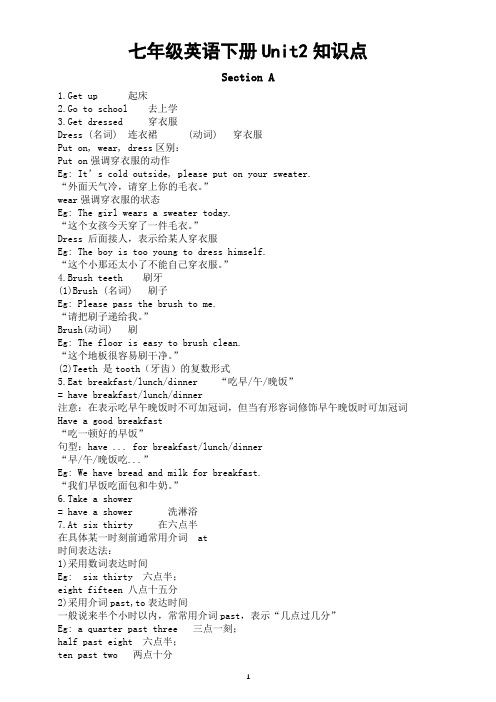
七年级英语下册Unit2知识点Section A1.Get up 起床2.Go to school 去上学3.Get dressed 穿衣服Dress (名词) 连衣裙 (动词) 穿衣服Put on, wear, dress区别:Put on强调穿衣服的动作Eg: It’s cold outside, please put on your sweater.“外面天气冷,请穿上你的毛衣。
”wear强调穿衣服的状态Eg: The girl wears a sweater today.“这个女孩今天穿了一件毛衣。
”Dress 后面接人,表示给某人穿衣服Eg: The boy is too young to dress himself.“这个小那还太小了不能自己穿衣服。
”4.Brush teeth 刷牙(1)Brush (名词) 刷子Eg: Please pass the brush to me.“请把刷子递给我。
”Brush(动词) 刷Eg: The floor is easy to brush clean.“这个地板很容易刷干净。
”(2)Teeth 是tooth(牙齿)的复数形式5.Eat breakfast/lunch/dinner “吃早/午/晚饭”= have breakfast/lunch/dinner注意:在表示吃早午晚饭时不可加冠词,但当有形容词修饰早午晚饭时可加冠词Have a good breakfast“吃一顿好的早饭”句型:have ... for breakfast/lunch/dinner“早/午/晚饭吃...”Eg: We have bread and milk for breakfast.“我们早饭吃面包和牛奶。
”6.Take a shower= have a shower 洗淋浴7.At six thirty 在六点半在具体某一时刻前通常用介词 at时间表达法:1)采用数词表达时间Eg: six thirty 六点半;eight fifteen 八点十五分2)采用介词past,to表达时间一般说来半个小时以内,常常用介词past,表示“几点过几分”Eg: a quarter past three 三点一刻;half past eight 六点半;ten past two 两点十分半小时过后多用介词to,表示“差几分到几点”Eg: a quarter to three 两点四十五;twenty to four 三点四十3)a. m. 和p. m.A.m. 表示“午前;上午”(午夜12:00后至中午12:00前);p.m. 表示“午后;下午”(中午12:00后至午夜12:00前)。
流利说商务英语Level4Unit2 Part3 Preparing for an Event
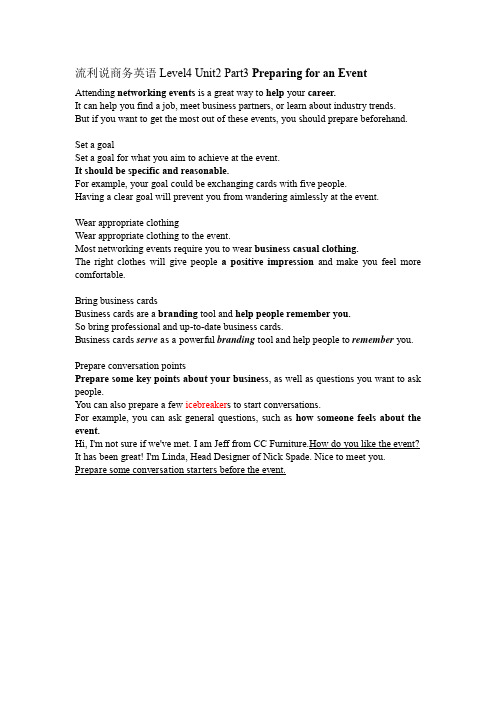
流利说商务英语Level4 Unit2 Part3 Preparing for an EventAttending networking events is a great way to help your career.It can help you find a job, meet business partners, or learn about industry trends.But if you want to get the most out of these events, you should prepare beforehand. Set a goalSet a goal for what you aim to achieve at the event.It should be specific and reasonable.For example, your goal could be exchanging cards with five people.Having a clear goal will prevent you from wandering aimlessly at the event.Wear appropriate clothingWear appropriate clothing to the event.Most networking events require you to wear business casual clothing.The right clothes will give people a positive impression and make you feel more comfortable.Bring business cardsBusiness cards are a branding tool and help people remember you.So bring professional and up-to-date business cards.Business cards serve as a powerful branding tool and help people to remember you. Prepare conversation pointsPrepare some key points about your business, as well as questions you want to ask people.You can also prepare a few icebreaker s to start conversations.For example, you can ask general questions, such as how someone feels about the event.Hi, I'm not sure if we've met. I am Jeff from CC Furniture.How do you like the event? It has been great! I'm Linda, Head Designer of Nick Spade. Nice to meet you. Prepare some conversation starters before the event.。
新课预习 Unit 2 Section A 2024年七年级英语下册人教版

第10讲新课预习七年级下册Unit 2 Section A目录新课预习:掌握重点词汇、短语、句子语法导航:掌握语法知识脉络重点解析:考点快速记忆小试牛刀:词句精练+能力提升一、词汇表up [ʌp] adv.向上get up 起床;站起dress [dres] v.穿衣服n.连衣裙get dressed 穿上衣服brush [brʌʃ] v.刷;刷净n.刷子tooth (pl. teeth) [tuːθ]n.牙齿shower ['ʃaʊə] n.&v.淋浴n.淋浴器(间)take a shower 洗淋浴usually ['juːʒʊəli]adv.通常地;一般地forty [ˈfɔːti]num.四十wow [waʊ] interj.(表示惊奇或敬佩)哇;呀never ['nevə] adv.从不;绝不early ['ɜːli]adv.&adj.早(的)fifty ['fɪfti] num.五十job [dʒɒb] n.工作;职业work [wɜːk]v.&n.工作station ['steɪʃən] n.电(视)台;车站radio station 广播电台o'clock [əˈklɒk] adv.(表示整点)……点钟night [naɪt] n.晚上;夜晚funny ['fʌni] adj.奇怪的;滑稽好笑的exercise ['eksəsaɪz] v.&n.锻炼;练习二、必背单词及相关短语1.up(adv.)向上→ get up 起床;站起→ look up 向上看→ put up 举起;张贴2.dress(v.)穿衣服(n.)连衣裙→ dress sb. 给某人穿衣服→ get dressed 穿上衣服3.forty(num.)四十→ in one’s forties 在某人四十多岁时4.early(adv. & adj.)早(的)→ late(反义词)5.station(n.)电(视)台;车站→ radio station 广播电台→ at the station 在车站6. night(n.)晚上;夜晚→ on a cold night 在一个寒冷的夜晚→ at night 在晚上7.exercise(v. & n.)锻炼;练习→ do exercise 进行锻炼8.group(n.)组;群→ a group of 一组;一群四、必背短语1. go to school 去上学2.be late for 迟到3.brush one’s teeth 刷牙4.take a shower 洗淋浴5.from...to... 从……到……五、必背句子1.What time do you usually get up, Rick?里克,你通常几点起床?2. I usually get up at six thirty. 我通常六点半起床。
一级下册英语课件-Unit 《Clothes》|牛津上海版 2

shorts
Shorts are short.
T-shirt s
I like T-shirts. I like shorts. I like T-shirts and shorts.
I like shorts. I like T-shirts. I like shorts and T-shirts.
1,2,3
I see .
4, 5
I see .
6 , 7, 8
I see
.
9 ,10
I see .
bTsdl-ohsrouehrstisrest
S1: Can I help you? S2: I like this red dress. S1: Here you are. S2: Thank you.
I like and
我们可以将衣服捐给那些有需要的人。
Let's chant
Let's learn
Let’s buy clothes
I like T-shirts.
I like T-shirts and shorts.
I like T-shirts and shorts.
A guessing game
Unit9 Clothes
S1: Can I help you?
I like T-shirts and shorts.
S2: Thank you.
I see .
I see a dress.
I like
and
dress
es
blouse s
One two three I see shorts. Four, five I see a T-shirt. Six , seven, eight I see a dress. Nine ,ten I see a blouse.
冀教版七年级上英语第二单元总复习
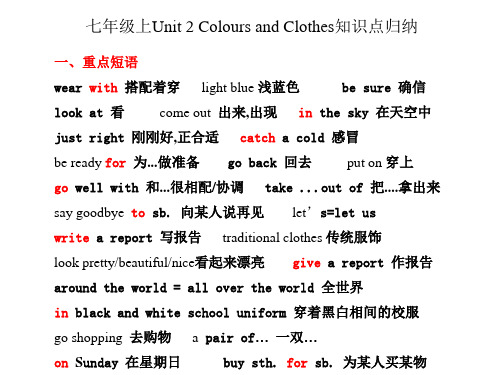
6. May I have (you) pen?
7. Please give ____ (you) English book to her.
8. The students are cleaning (they) classroom now.
9. Could you help ( I ) with ( I ) English?
服是衬衫和连衣裙。 —What’s your favourite sport? 你最喜欢的运动是什么? —My favourite sport is Ping-pong. 我最喜欢的运动是乒乓
球。 (同义句)English is my favourite.=I like English best.
4. Whose coat is this? 这是谁的外套? Whose gloves are these? 这是谁的手套?
Whose “谁的”,用来询问物品的主人,即物品的所有者是谁,也就是 说whose对物主代词(my,your,his,her,its,their)和名词所有格(如: Bob’s, Jenny’s, Danny’s)进行提问,其后必须接名词。即: Whose +名词单数 + is this? ----It’s +物主代词/名词所有格+名词单数 Whose +名词复数 + are these? ---They are +物主代词/名词所有格+名词 复数 Eg: Whose scarf is this? --- It’s my scarf. Whose shorts are these? 这是谁的短裤?
you
作主 用who
they
语动 词前
提问
六年级英语下Unit2知识点梳理

第二单元知识点梳理过去式短语1. clean---cleaned cleaned my room 打扫我的房间2. wash ---washed washed my clothes 洗我的衣服3.stay---stayed stayed at home待在家里4. watch---watched watched TV 看电视5. read---read read a book看书6. have---had had a cold 感冒7. see---saw saw a film 看电影8.drink---drank drank tea 喝茶9.do ---did did something else 做其他事情10. go---went went boating 去划船11. make---made made the beds铺床12. cook--cooked cooked the food 做饭13. visit--visited visited my grandparents 看望我的外祖父母14. play--played played football 踢足球15. study--studied studied English 学英语不规则过去式read---read have/has---had see---saw sleep---slept drink---drank do/does ---did go---went make---made am/is---was are---were get---got was not---wasn’t were not---weren’t did not---didn’t短语last weekend 上个周末last Monday上个星期一last night昨晚yesterday evening昨天晚上the day before yesterday前天feel better感觉更好talk about a lot of new films谈论许多新电影fix a broken chair 修理了一把破损的椅子taste bad 尝起来变质listen to loud music听大声的音乐enjoy our stay享受我们的入住句子1. How was your weekend? 你周末过得怎么样?It was good, thank you.很好,谢谢!2. What did you do last weekend? 你上个周末干了什么?3.I stayed at home with your grandma.我和你奶奶呆在家里.(with和谁)4.. Did you do anything else? 你还做了其他什么事吗?5.I cleaned my room and washed my clothes.我扫了房间,还洗了衣服。
(完整版)unit2课文翻译TheVirtuesofGrowingOlder
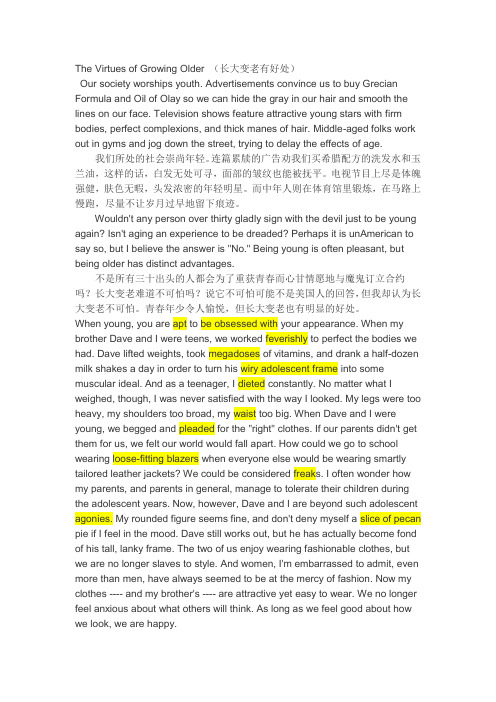
The Virtues of Growing Older (长大变老有好处)Our society worships youth. Advertisements convince us to buy Grecian Formula and Oil of Olay so we can hide the gray in our hair and smooth the lines on our face. Television shows feature attractive young stars with firm bodies, perfect complexions, and thick manes of hair. Middle-aged folks work out in gyms and jog down the street, trying to delay the effects of age.我们所处的社会崇尚年轻。
连篇累牍的广告劝我们买希腊配方的洗发水和玉兰油,这样的话,白发无处可寻,面部的皱纹也能被抚平。
电视节目上尽是体魄强健,肤色无暇,头发浓密的年轻明星。
而中年人则在体育馆里锻炼,在马路上慢跑,尽量不让岁月过早地留下痕迹。
Wouldn't any person over thirty gladly sign with the devil just to be young again? Isn't aging an experience to be dreaded? Perhaps it is unAmerican to say so, but I believe the answer is "No." Being young is often pleasant, but being older has distinct advantages.不是所有三十出头的人都会为了重获青春而心甘情愿地与魔鬼订立合约吗?长大变老难道不可怕吗?说它不可怕可能不是美国人的回答,但我却认为长大变老不可怕。
牛津上海版(试用本)三年级下册英语 Module 2 Unit 3 Clothes课件

听一听,填序号。
I am Peter.
Peter is wearing a green T-shirt.
他穿着绿色的T恤。
He is wearing blue shorts.
他穿着蓝色的短裤。
He is wearing red shoes.
2 Listen and point.
听一听,指一指。
Groupwork
Play a memory game.
玩记忆游戏。
3 Listen and mime the actions.
听一听,做动作。
Turn off the alarm clock.关掉闹钟。 Get out of the bed.从床上下来。 Put on your T-shirt.穿上你的T恤。 Put on your shorts.穿上你的短裤。 Put on your socks.穿上你的袜子。 Put on your trainers.穿上你的运动鞋。 Put on your cycle helmet.带上你的自行车头盔。 Open the door.打开门。 Shout:"Oh, no!"大喊:“噢,不!”
Sue
4b Read and colour the picture.
读一读,涂颜色。
Mike is wearing a green cap. He ia wearing a red T-shirt. He is wearing green jeans, black socks and brown shoes.
Clothes
词汇
毛衣
sweater
牛仔裤
仁爱版七年级英语上册Unit 2知识点总结
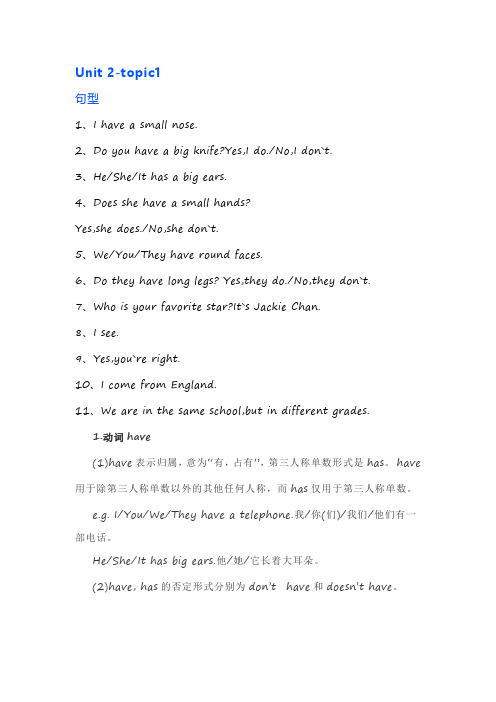
Unit 2-topic1句型1、I have a small nose.2、Do you have a big knife?Yes,I do./No,I don`t.3、He/She/It has a big ears.4、Does she have a small hands?Yes,she does./No,she don`t.5、We/You/They have round faces.6、Do they have long legs? Yes,they do./No,they don`t.7、Who is your favorite star?It`s Jackie Chan.8、I see.9、Yes,you`re right.10、I come from England.11、We are in the same school,but in different grades.1.动词have(1)have表示归属,意为“有,占有”,第三人称单数形式是has。
have 用于除第三人称单数以外的其他任何人称,而has仅用于第三人称单数。
e.g. I/You/We/They have a telephone.我/你(们)/我们/他们有一部电话。
He/She/It has big ears.他/她/它长着大耳朵。
(2)have, has的否定形式分别为don’t have和doesn’t have。
e.g. I/You/We/They don’t have a car.我/你(们)/我们/他们没有小汽车。
He/She/It doesn’t have a friend.他/她/它没有朋友。
(3)have和has的一般疑问句及其答语。
have和has的一般疑问句是在句首加Do或Does构成,谓语动词都是have。
e.g. —Do I/you/we/they have a car?我/你(们)/我们/他们有辆小轿车吗?—Yes, you/I/we/they do.是的,你(们)/我/我们/他们有。
小学英语二年级下UNIT2《CLOTHES》教案分享
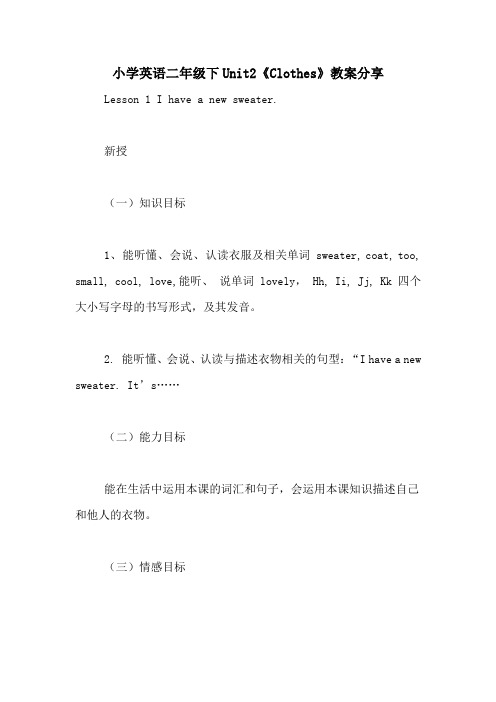
小学英语二年级下Unit2《Clothes》教案分享Lesson 1 I have a new sweater.新授(一)知识目标1、能听懂、会说、认读衣服及相关单词 sweater, coat, too, small, cool, love,能听、说单词 lovely, Hh, Ii, Jj, Kk 四个大小写字母的书写形式,及其发音。
2. 能听懂、会说、认读与描述衣物相关的句型:“I have a new sweater. It’s……(二)能力目标能在生活中运用本课的词汇和句子,会运用本课知识描述自己和他人的衣物。
(三)情感目标培养学生将知识用于现实生活的能力和合作精神。
借助情境适时的对学生进行情感教育,教育学生养成保管物品、物品的好习惯。
(一)教学重点1. 能正确认读和书写字母 H~ K。
2.能听懂、会说、认读衣服及相关单词 sweater, coat, too, small, cool, love,lovely,并能结合句型灵活运用。
3.能听懂、会说、认读与衣物相关的句型:“I have a new sweater.”(二)教学难点能运用所学句型描述自己及他人的衣物。
TPR,任务型教学法,情境教学法课件、字母卡、单词卡、学生提前准备春节家长给自己买的新衣服、衣服小图片,电子白板(一).Warming-up1.Greetings.2.Have a chant. 利用上学期颜色身体部位的韵律诗来导入下面的教学。
3.Revision. 利用学生手中的多种学习用具、颜色以及刚才韵律诗中的句子进行问答。
What’s this? It’s a pencil. What colour is it? It’ s blue. 【设计意图】韵律诗既营造了课堂气氛,复习了旧知,也使学生迅速进入到英语学习状态,为下面学习新课做好铺垫。
利用学生们自己手中的学习用具来进行问答,并用学习用具替换身体部位,不留痕迹的复习旧知,同时为本课新知做铺垫。
人教版七年级英语上册UNIT 2 学情测试卷含答案

人教版七年级英语上册UNIT 2 学情测试卷一、单项选择(每小题1分,共10分)1. —What can you do, Sarah?—I can play ____ violin, but I can't play ____ chess.A. 不填;不填B. the; theC. the; 不填D. 不填;the2. —Is Jim your cousin?—Yes, he is. He is my aunt's ____.A. brotherB. sisterC. daughterD. son3. —Ella always ____ too much time playing computer games.—That's too bad.A. spendsB. greetsC. countsD. writes4. The TV show is really ____. All of us like to watch it.A. differentB. smartC. funnyD. young5. —Sally ____ likes pink.—Yeah! Her schoolbag and her clothes are all pink.A. usuallyB. reallyC. safelyD. early6. —What does the sign(标志) ____?—Sorry, I don't know.A. loveB. needC. haveD. mean7. This is ____ room. It's very tidy.A. Lily and Lucy'sB. Lily and LucyC. Lily's and Lucy'sD. Lily's and Lucy8. My school life is colorful. There are different kinds of ____ for us to choose(选择)from.A. astronautsB. hobbiesC. activitiesD. mistakes9. —Does Jane like tigers?—____. She likes pandas.A. Yes, she doesB. No, she doesn'tC. Yes, she doesn'tD. No, she does10. —I will go to the beach with my family tomorrow.—____.A. Have funB. I'm sorryC. Thank youD. See you二、完形填空(每小题1分,共10分)This is Han Mei. She is a Chinese girl. She is from Shanghai, China. Her English __11__ is Amy.This girl has a __12__ family. There are __13__ people in her family. They are her father, her mother, her sister and Amy. Her parents like __14__ very much. They __15__ ping-pong every day. Her father is __16__,and her mother is beautiful. Amy's sister is a middle school student. She studies very hard. Her English is very good. Her English teacher Mrs King likes __17__ very much. Amy likes collecting (收集) pens. In her room you can see a lot of new and old pens. Amy also likes animals very much. She has a __18__ at home. Its name is Qiuqiu. She often takes it to the park. Oh, her dog's __19__ is black and white. Look! It is wearing a pink __20__ on its head. How cute!11. A. unit B. nameC. bandD. game12. A. wrong B. funnyC. terribleD. small13. A. two B. threeC. fourD. five14. A. sports B. clothesC. flowersD. photos15. A. have B. callC. keepD. play16. A. long B. handsomeC. tidyD. slow17. A. me B. youC. himD. her18. A. door B. keyC. dogD. kid19. A. color B. floorC. gradeD. hobby20. A. sock B. hatC. skirtD. shirt三、阅读理解(每小题2分,共30分)AI am Grace. Here is my family.21. Where does Grace's mother work?A. In a hospital.B. In a school.C. In a supermarket.D. At home.22. What does Scott Black like?A. Going hiking.B. Playing basketball.C. Reading.D. Animals.23. Who is Tony Black?A. Grace's friend.B. Grace's father.C. Grace's cousin.D. Grace's brother.24. From the passage we know ____.A. Jessica is Tony's teacherB. Tony is 40 years oldC. Jessica is Grace's motherD. Scott is Tony's uncle25. The main idea (主旨大意) of this passage is about ____.A. Grace's parentsB. Grace's schoolC. Grace's familyD. Grace's dayBMr. Black and Mrs. Black have a happy family. Here's a photo oftheir family. The man on the left is Mr. Black. He's a doctor. Thewoman on the right is Mrs. Black. She's a teacher. An old woman inthe middle is Grandma. Mr. Black and Mrs. Black have two kids. Theboy in front of Mr. Black is his son. His name is Jack. He's twelve years old. He likes going hiking. Next to him is his sister, Kate. She's ten years old. She has big eyes and loves animals.Jack and Kate are in the same school, but they're in different grades. Jack is in Grade Seven and Kate is in Grade Five. They're good students at school. They study hard and they like to help their classmates. At home they like to help their dad andmom do housework (家务). Their dad and mom love them very much. They love their dad and mom, too.26. What does Mrs. Black do?27. Where is Kate in the photo?A. Next to her dad.B. Next to her grandma.C. Next to her mom.D. Next to her brother.28. How many people are there in the photo?A. Six.B. Five.C. Four.D. Three.29. What is Paragraph 2 about?A. The family photo.B. Jack's clothes.C. Kate's school.D. Jack and Kate.30. What can we learn from the text?A. Kate and her mom are in the same school.B. Jack is in a green shirt in the photo.C. They have a happy family.D. Kate and Jack are classmates.CI'm Dick. I have a big family. My family take photos every year. In my eyes, these photos are great. They can help us record our happy times. We often have a look at them when we are free. Now I want you to see a photo.When do we take the photo? During the Spring Festival (春节期间) this year. All my family come back home to celebrate (庆祝) the new year. So we take the phototogether.My two grandfathers, two grandmothers, my parents, my sister and I are in this photo. We all have big smiles (微笑) on our faces. My grandparents sit in the chairs, and I am in front of them. The two people next to my grandparents are my father and mother. My sister is in their arms. Everyone looks very happy in the photo. I like the photo very much.Next year, I want to take photos with my family in my school. That is very nice.31. What does the underlined word “record” mean in Chinese?A. 依靠B. 记录C. 遗忘D. 吸引32. How does the writer begin Paragraph (段落) 2?A. By (通过) asking a question.B. By showing an example (举例).C. By giving numbers.D. By telling a story.33. ____ people are in the photo.A. FiveB. SixC. SevenD. Eight34. Where is Dick's sister?A. In the chair.B. Next to her parents.C. In her parents' arms.D. In front of her grandparents.35. What's the best title (最佳标题) for the text?A. My family storyB. My family photoC. The Spring FestivalD. A photo of my school四、任务型阅读(每小题2分,共10分)Ben is from the US. He is my neighbor(邻居), and this is a photo of his family.Ben has a big family. Look! His grandfather and grandmother are on the sofa. Ben's father is a doctor. He works in a hospital. He__drives__his__car__to__work. Ben's mother is a teacher. She teaches English in our school. The man in white is Ben's uncle. The young woman in red is Ben's aunt. They are office workers. Ben's family live in Beijing now.Ben and I are classmates. We are good friends.36题完成句子;37、38 题简略回答问题;39 题找出并写下第二段的主题句;40 题将文中画线句子译成汉语。
人教精通版六年级英语下册Unit 2 综合检测卷含答案

人教精通版六年级英语下册Unit 2 综合检测卷时间:40分钟满分:100分题号一二三四五六七八九十十一十二总分得分听力部分(30分)一、听句子, 用1—5给下列图片排序。
(5分)()()()() () 二、听问句, 选择合适的答语。
(5分)()1. A. Yes, there is. B. There is a bank. C. Yes, there are.()2. A. Go down the street and turn right. B. No, there isn't.C. Sure. Here you are.()3. A. It's near my school. B. A school. C. It is far.()4. A. Once a week. B. Only a few minutes.C. Tomorrow morning.()5. A. By subway. B. Thanks a lot.C. It's near the supermarket.三、听短文, 判断下列句子正(T)误(F)。
(10分)()1. There is a new park near my house.()2. On my left, there is a big lake.()3. There is a small hill behind the lake.()4. There is a playground in front of the lake.()5. The park is very beautiful and we like it very much.四、Li Yan报名参加了幸福里社区举办的“情暖夕阳, 关爱老人”志愿者服务活动,活动在社区的疗养院举行, Li Yan正在询问去疗养院的路。
听对话, 填入所缺单词或词组。
(10分)Li Yan: Excuse me. Where is the nursing home (疗养院) of the Xingfuli 1.____________?Man: It's 2. ____________ the Yunhe Park.Li Yan: How can I get there?Man: Go straight (笔直地) and turn 3. ____________ at the 4. ____________ crossing. You'll 5. ____________ the Yunhe Park. The nursing home is 6.____________ the Yunhe Park.Li Yan: How long does it take to go there 7. ____________?Man: About twenty 8. ___________. Maybe you can go there 9. ____________.Li Yan: Thanks a lot.Man: You're 10. ____________.笔试部分(70分)五、根据句意及首字母提示, 补全句子。
鲁科版三年级下册Unit-2-Clothes-单元测试
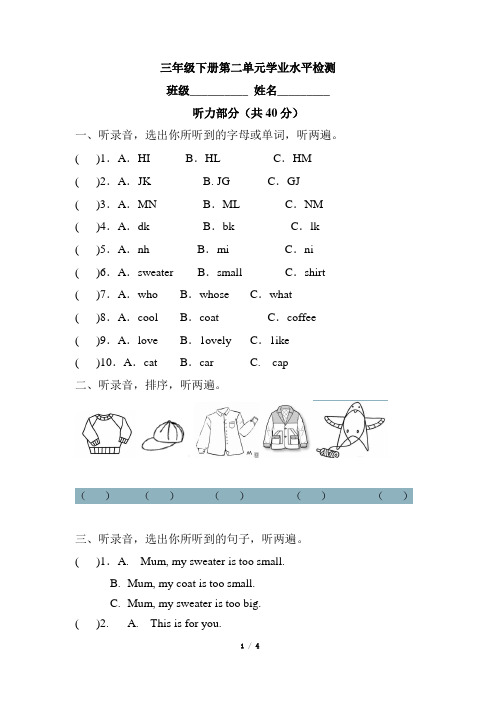
三年级下册第二单元学业水平检测班级__________ 姓名_________听力部分(共40分)一、听录音,选出你所听到的字母或单词,听两遍。
( )1.A.HI B.HL C.HM( )2.A.JK B. JG C.GJ( )3.A.MN B.ML C.NM( )4.A.dk B.bk C.lk( )5.A.nh B.mi C.ni( )6.A.sweater B.small C.shirt( )7.A.who B.whose C.what( )8.A.cool B.coat C.coffee( )9.A.love B.1ovely C.1ike( )10.A.cat B.car C. cap二、听录音,排序,听两遍。
()()()()()三、听录音,选出你所听到的句子,听两遍。
( )1.A. Mum, my sweater is too small.B.Mum, my coat is too small.C.Mum, my sweater is too big.( )2. A. This is for you.B.That is for you.C.These are for you.( )3.A. Is this your coat?B.Is this your cap?C.Is this your sweater?( )4.A. My shirt is black.B.Danny’s shirt is black.C.Guo Yang’s shirt is black.( )5.A.Whose shirt is that?B.Whose shirt is this?C.Whose sweater is that?四、听音,连线。
1.The coat is white.2.Whose shirt is that? is black.3.Is this your shirt? It's Peter's.4.Danny’s kite No,it isn’t.5.I have a new coat五、听录音,写出你所听到字母的大小写。
二年级上册英语优质教案-Unit 2 Clothes Lesson 9|清华版

UNIT2 CLOTHESLESSON 9【教学目标】1.确保学生认识和理解一些服装单词的意义和简单口头运用。
2.需要掌握的词组:dress, skirt, bus, bike3.学习使用本课重点句型:(1)Mother, can I wear my new dress today?(2)Yes, you can.(3)What a beautiful dress!4.鼓励学生大胆发言及描述自己和他人的衣着。
5.培养学生能够将所学知识运用到生活实际以及情境中去。
6.增强学生听说读写译的能力。
【教学重点】在学习了服装单词的基础上,以单词为载体,进行主要句型的学习,句型Can I wear...?以及其肯定回答。
【教学难点】能掌握一些服装单词的拼写和造句,了解一定的语法内涵,与人进行服装话题的沟通交流。
句型Can I wear...?以及肯定回答。
【教学方法】1.音频,情景教学法。
2.Pair-work两人小组活动,Group-work小组活动,多媒体辅助教学。
【教学准备】课件、图片素材、音频文件、教学道具。
【教学过程】Step 1.Greeting.教师和学生之间,进行日常口语问候,让学生介绍自己穿了什么颜色的裙子。
Step 2.Warm-up/Leading.教师通过多媒体教学课件,播放和本次主题有关的歌曲。
Step 3.Presentation.1.Words Learning.(1)老师放映课件,用中文询问同学看到了什么?同学们会看到课件上呈现的服装类单词卡片。
(2)教师拿出单词卡片,进入重点新词汇学习环节,向同学展示图片,结合PPT上放映的内容,带领同学学习一些新单词。
2.Let's talk.做一些服装的图片,让学生在真实的情景中学习语言。
小组之间的合作在这里得到了充分体现,可以说是全员都参与了,所有人都在说,都在动。
3.Vocabulary Part.教师教授重点词汇:dress, bus, bike4.Listening Part.请听课文内容,并回答课文内的相关问题!(1)What does the girl want to wear today?(2)What does her mother say?5.Reading Part.(1)教师立足于课本,引导学生学习课本上的课文。
- 1、下载文档前请自行甄别文档内容的完整性,平台不提供额外的编辑、内容补充、找答案等附加服务。
- 2、"仅部分预览"的文档,不可在线预览部分如存在完整性等问题,可反馈申请退款(可完整预览的文档不适用该条件!)。
- 3、如文档侵犯您的权益,请联系客服反馈,我们会尽快为您处理(人工客服工作时间:9:00-18:30)。
Unit 2 The Right Clothes- Unit2TheRightclothes
Lesson2
大声读单词
.when
adv.什么时候
fortable
adj.舒适的
3.pink
n.粉红色(的)
4.specialadj.特别的;特殊的
5.party
n.聚会
6.even
adv.甚至,即使
7.pair
n.双,对,
8.apairof一双,一对
9.ofcourse
当然,自然
0.hurt
v.伤害;疼痛
1.prettyadj.漂亮的,可爱的
2.sweatern.毛衫
重点词汇
.when
要点:
adv.atwhattime什么时候
whencanyoucome?你什么时候能来?
IstillrememberthenightwhenNanjingwasliberated.
我还记得南京解放那天晚上的情景。
conj.
)在….的时候,就在那个时候
Itwasrainingwhenwestarted.我们动身时正下着雨。
2)如果
Turnofftheswitchwhenanythinggoeswrongwiththemachine.
3)虽然;然而;可是
wehaveonlythreebookswhenweneedfive.虽然我们需要五本书,却只有三本。
4)既然
whyusewoodwhenyoucanuseplastic?
既然能用塑料,为什么还要用木料?
pron.什么时候,那时
whenelseshallwemeetagain,ifAugust1stisnotconvenient foryou?
要是八月一日对你不方便,那么另外什么时候再碰头呢?
Sincewhenhavehehadacar?他从什么时候起开始有了一辆汽车?
Shewroteamonthago,sincewhenwe’veheardnothing.
一个月前她来过信,从那时起我们就没听到过她的消息。
fortable
要点:
adj.舒适的;觉得舒服的
comfortablechair
舒适的椅子
Pleasemakeyourselfcomfortable.别客气。
Thedoctorsaidthatthepatientwascomfortableafterherop eration.
医生说病人手术后不怎么难受。
3.pink
要点:
n.粉红色(的)
bedressedinpink穿粉红色衣服
adj.粉红的
4.special
要点:
adj.
)特别的;特殊的
Hehasaspecialcarbecausehecannotwalk.他有一辆专车,因为他不能走路。
Thisisaspecialdayinthehistoryofourcountry.
今天是我国历史上一个特殊的日子。
2)专门的,专用的,
aspecialhospital专门医院
Theywillalsobuildnewroadsandaspecialrailway-line.
他们还打算修建一些新的公路和一条专用铁路线。
5.party
要点:
n.
)聚会
DidyouenjoyAlice’sbirthdayparty?在爱丽丝家举行的那次生日聚会上你玩得痛快吗?
ateaparty茶会
give/holdadinner(anevening)party举行宴[晚]会
2)党,政党,
apoliticalparty政党
thecommunistPartyofchina (thechinesecommunistParty)中国共产党
enter/jointheParty
入党
thedemocratic-ties民主党派
whatisthepartylineonthedevelopmentinthesocietyofkno wledgeeconomy?
这个政党对知识经济社会的发展策略的立场是什么?
3)团体;一伙人
Theteacheristakingapartyofchildrentothelibrary.
老师正带领一队孩子去图书馆。
ApartyofschoolchildrenisgoingtoFrance.一群学生将去法国。
6.even
要点:
adv.甚至,即使
Evennowitisnottoolate.就是现在也不太迟。
“It’sraining.Evenso,wemustsetoff.”“天在下雨,尽管如此我们还是要出发。
”
Helookedpleased,evendelighted.他看上去很高兴,甚至可以说喜气洋洋。
It’sevencolderthanyesterday.今天比昨天更冷。
adj.
)平的,平滑的,
cutthebushesevenwiththefence.把树丛剪得和篱笆一样高。
Thisrefrigeratedoesn’tseemtobeveryeven.justputablockofwoodunderitsbottom.
“这台冰箱似乎放不平,在冰箱的底下放一块木头吧。
”
2)偶数的,
2,4,6,8etc.areevennumbers.二、四、六、八等是偶数。
7.pair
要点:
n.双,对,
Twomorepairsoftrousersaredirty.另外两条裤子脏了。
apairofscissors一把剪刀
Thehappypairis/aregoingtoGenevaaftertheirwedding.
这幸福的一对婚后将去日内瓦。
8.ofcourse
当然,自然
9.hurt
v.
)使受伤;伤害
myleghurts.我的腿受伤了。
2)疼痛
myshouldershurt.我的两肩有点痛。
3)使人伤心;使人痛苦
She’shurtbecauseyouhaven’tvisitedher.她很伤心,因为你没有去看她。
you’llhurtherfeelingsifyouforgetherbirthday.
“如果你忘了她的生日,那会伤她感情的。
”
0.pretty
要点:
adj.漂亮的,可爱的
whataprettydressyoursisteriswearingtoday!你妹妹今天穿的衣服多漂亮!
Shelooksmuchprettierwithlonghairthanwithshorthair.
她留长发比留短发时看上去标致得多。
prettymusic优美的乐曲
adv.相当;颇
prettywell相当好
prettysoon立刻
Itwasaprettyseriousaccident.这是一次相当严重的事故。
Itwillcostaprettypenny.这要花相当多的钱的。
1.sweater
要点:
n.厚运动衫,毛线衫
willmysweatergoinyourknapsack?你的背包里还放得下我的球衣吗?
重点解析
.Sheiswearingapinkandwhitesweater.
2.–can
yourunfast?
ofcourse,Iamveryfast.
3.——Howmanyredshoesdoyouhave?
——Ionlyhaveonepairofthem.
only在句子中的位置不同,句子的意思或侧重点也不同。
例:onlyhewenttothecinema.只有他去看电影了。
Heonlywenttothecinema.他只去看了电影。
